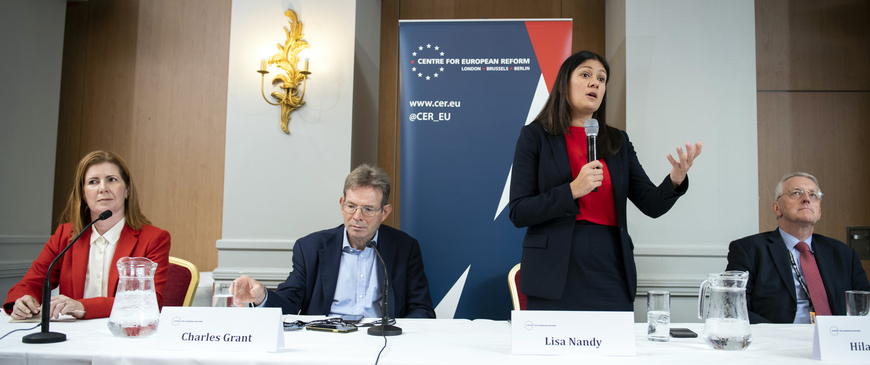
Brexit briefing: The opposition realised this week it cannot upset voters with talk
Which leads to the third reason for Labour’s reticence on Brexit — that it still doesn’t have any clear ideas about how it wants, as Starmer put it, to “fix the holes” in the TCA.
This much was clear at a fringe event held by the Centre for European Reform featuring Lisa Nandy, the shadow foreign secretary, Jenny Chapman who shadows Frost in the Lords and Hilary Benn, the former Brexit select committee chair.
There was agreement among the triumvirate that Labour cannot fight the next election on a platform of rejoining the EU single market and customs union, while at the same time citing the party’s desire for an “ambitious, close and lasting” relationship.
“Get over it and move on, that’s what the public has said to us in 2019, but how we move on is up for grabs,” said Chapman, but that was about as much clarity as the discussion could bear at the current moment.
Challenged on what relationship, precisely, Labour would accept having ruled out the single market and customs union, the discussion got decidedly vague.
Nandy said Labour would “go to the EU and ask for some good will and flexibility” while Benn argued the Ukraine association agreement could provide a template — ignoring that that was a deal that was specifically designed for a state moving towards membership.
Indeed the entire discussion was redolent of the debacle over ‘Norway for Now’ when the Labour party indulged in much the same kind of cakeism that the Tories did, before Johnson opted for the hardest possible Brexit.
All three agreed that freedom of movement could not return, but wanted to create “as close a relationship as possible”; and a fix to the Northern Ireland protocol without joining a customs union with the EU.
To be fair, the woolliness is understandable given the scarring of the Brexit years, but it is equally true that talk of “bespoke” deals and “close relationships” shows how far Labour is, politically, from levelling with the public about the trade-offs implicit in the decision to leave the EU.
In the fullness of time, as Chapman observed, it is possible that the debate will shift — on immigration, on the need to trade more freely with our geographical neighbourhood and the need for a mobility chapter and more regulatory alignment — and that the public will accept that giving up some areas of control is worth the gains.
“I think that will be understood by the public and I feel the toxicity around this debate is subsiding around some of these solutions,” she said.
